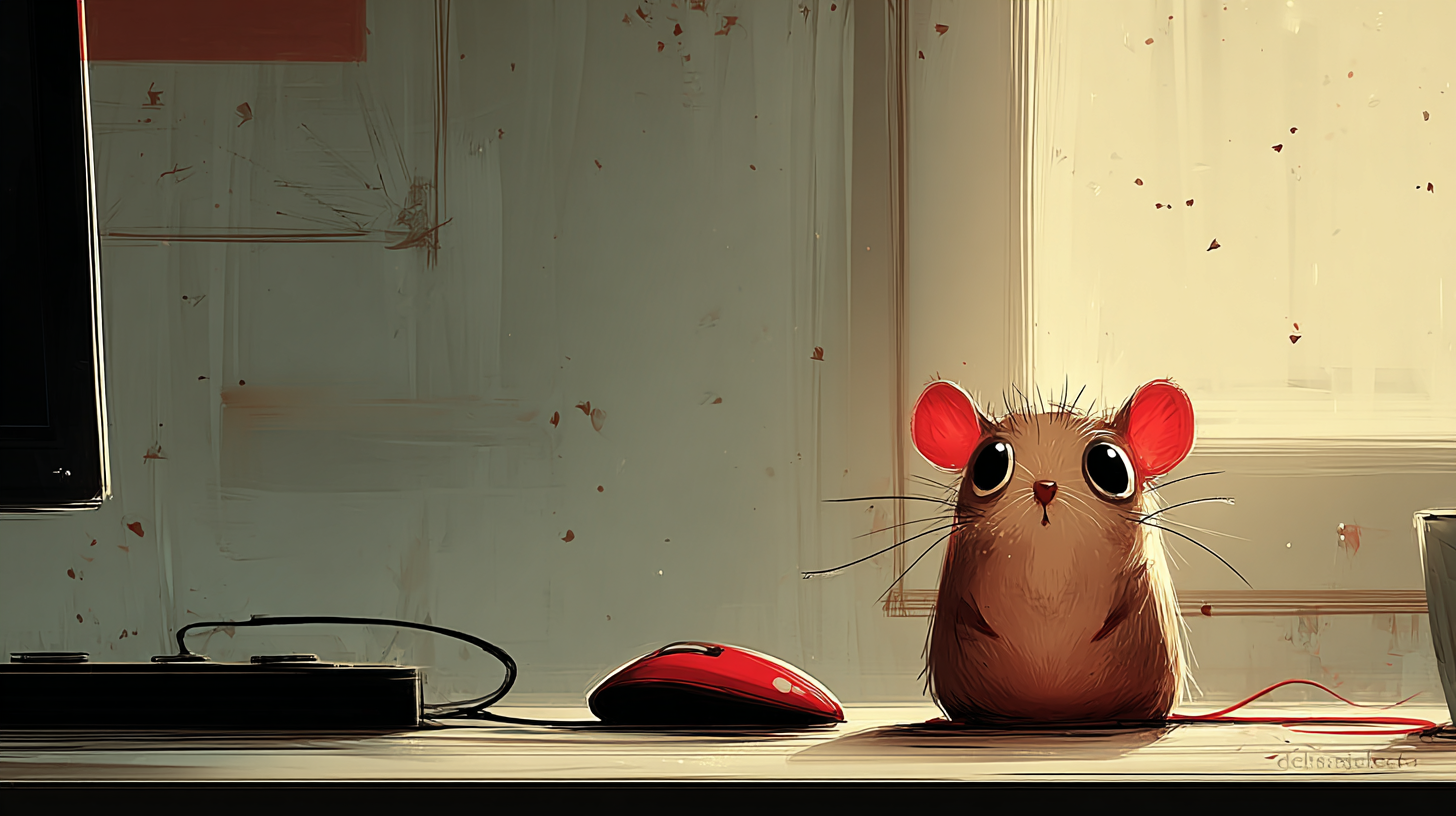A “mouse” means a small animal or a computer tool you use with your hand.
「mouse」は「小さな動物のネズミ」や「パソコンを操作するマウス」を意味する。
以下は英単語 “mouse” に関するストーリー型学習コンテンツです。まずは大枠の意味を理解して最後の文章で確認しましょう。
主な意味(main meaning)
| 品詞 | 発音記号 | 意味 | 例文 |
|---|---|---|---|
| 名詞 | /maʊs/ | ネズミ(小さい動物) | A mouse ran across the kitchen floor. |
| 名詞 | /maʊs/ | マウス(コンピュータを操作する道具) | I clicked the mouse to open the file. |
語源(etymology)
古英語「mūs」から来ており、インド・ヨーロッパ語根「*mus-」(小さいネズミ)に由来。小さくて素早く動くイメージが核。コンピュータの「mouse」は、見た目が動物に似ていることから名付けられた。
類義語(synonyms)
| 類義語 | 例文 |
|---|---|
| rat | A rat is bigger than a mouse. |
| rodent | A mouse is a kind of rodent. |
| pointer | Use the pointer to select the text. |
| tracker | This tracker works like a mouse on the screen. |
反義語(antonyms)
| 反義語 | 例文 |
|---|---|
| cat | The cat chased the mouse. |
| keyboard | He prefers the keyboard to the mouse. |
コロケーション(collocations)
| コロケーション | 例文 |
|---|---|
| mouse trap | They set a mouse trap in the kitchen. |
| computer mouse | I bought a new computer mouse yesterday. |
| mouse hole | The cheese was near the mouse hole. |
| wireless mouse | She uses a wireless mouse for her laptop. |
2項表現(binomials)
| 2項表現 | 例文 |
|---|---|
| cat and mouse | The game felt like a cat and mouse chase. |
| clicks and scrolls | Modern work involves many clicks and scrolls with the mouse. |
英語ストーリー(english story)
The Office and the Mouse
One Monday morning, Ken walked into his office carrying his laptop. He sat down at his desk and turned on the computer. As soon as the screen lit up, he reached for his computer mouse. He used it every day to open files, check emails, and browse the internet. But today, something strange happened. The mouse didn’t work. He clicked several times, but nothing moved on the screen.
“Maybe the batteries are dead,” he thought. He replaced them quickly, but still nothing happened. Frustrated, Ken borrowed a wireless mouse from his colleague, Aya. With her help, he was able to finish his morning tasks.
At lunch, Aya told him, “This is just like a cat and mouse game between you and technology. Every time you fix one problem, another appears.” They both laughed.
After lunch, Ken went to the supply room to look for another mouse. While searching, he noticed something small running across the floor. It was a real mouse. Surprised, Ken called the building manager. Soon, they set up a mouse trap near the wall. “I guess this office has both kinds of mice,” Ken joked.
Later that afternoon, Ken prepared a presentation. He needed to show his ideas clearly, so he practiced with the mouse by making many clicks and scrolls. Suddenly, he remembered a story from his childhood. Once, he saw a rat in his grandmother’s house, and his grandmother told him, “A rat is bigger than a mouse, but both are clever animals.”
Ken smiled at the memory and continued working. When his boss arrived, Ken used his new computer mouse to control the slides. Everything went smoothly. His boss was impressed and said, “Good job, Ken. You handled today’s problems well.”
By the end of the day, the real mouse in the office was caught safely and released outside. Ken realized that life in the office sometimes felt like a game of cat and mouse, but with patience, every problem could be solved.
和訳
オフィスとマウス
ある月曜日の朝、ケンはノートパソコンを持ってオフィスに入った。机に座り、コンピュータの電源を入れた。画面が光るとすぐに、彼は**マウス(mouse:パソコンを操作する道具)**に手を伸ばした。毎日それを使ってファイルを開いたり、メールを確認したり、インターネットを見たりしていた。しかし今日は、何か変なことが起こった。マウスが動かなかったのだ。何度もクリックしたが、画面は動かなかった。
「電池が切れたのかもしれない」と思った。彼は急いで電池を取り替えたが、まだ動かなかった。困ったケンは同僚のアヤから**ワイヤレスマウス(wireless mouse:無線マウス)**を借りた。彼女の助けで午前中の仕事を終えることができた。
昼休みにアヤが言った。「これはまるでテクノロジーとの**cat and mouse(猫とネズミの追いかけっこ)**ね。1つ問題を直すと、また別の問題が出てくるわ。」二人は笑った。
昼食後、ケンは別のマウスを探しに備品室へ行った。探していると、小さなものが床を走った。それは本物の**ネズミ(mouse:小さな動物)だった。驚いたケンはビル管理人を呼んだ。すぐに彼らは壁の近くにマウストラップ(mouse trap:ネズミ捕り)**を仕掛けた。「このオフィスには2種類のマウスがいるんだな」とケンは冗談を言った。
午後、ケンはプレゼンの準備をした。アイデアを分かりやすく見せるために、マウスを使って何度も**クリックとスクロール(clicks and scrolls:クリックとスクロール)を練習した。突然、子どものころのことを思い出した。祖母の家でラット(rat:大型のネズミ)**を見たとき、祖母が「ラットはマウスより大きいけど、どちらも賢い動物だ」と言ったのだ。
ケンはその記憶に微笑み、仕事を続けた。上司が来ると、ケンは新しい**コンピュータマウス(computer mouse:コンピュータ用マウス)**でスライドを操作した。すべてが順調に進み、上司は「よくやった、ケン。今日の問題をうまく処理したね」と言った。
その日の終わりには、本物のネズミは安全に捕まり、外に放された。ケンは、オフィスでの生活は時々猫とネズミのゲームのように感じるが、忍耐があればすべての問題は解決できると気づいた。
Q&A
Q: 「mouse」と「rat」の違いは?
A: 「mouse(マウス)」は小さなネズミで、体も尾も短めです。「rat(ラット)」はより大きく、街や下水にいるネズミを指すことが多いです。
Q: 「mouse」と「rodent」の違いは?
A: 「mouse(マウス)」はネズミという特定の動物を指します。「rodent(げっ歯類)」はネズミを含むハムスターやリスなどの仲間全体を指す広い言葉です。
Q: 「mouse」と「pointer」の違いは?
A: 「mouse(マウス)」は手で操作する装置そのものです。「pointer(ポインター)」はパソコン画面上で動く矢印のことを指します。
Q: 「mouse」と「tracker」の違いは?
A: 「mouse(マウス)」は一般的な入力装置です。「tracker(トラッカー)」はマウスのように動きを感知する装置全般を指し、指でなぞるトラックパッドなども含みます。
Q: 「mouse」と「cat」の違いは?
A: 「mouse(マウス)」は捕まえられる側の小動物です。「cat(ネコ)」はそれを追いかける捕食者です。
Q: 「mouse」と「keyboard」の違いは?
A: 「mouse(マウス)」はカーソルを動かす入力装置です。「keyboard(キーボード)」は文字を入力する装置です。役割がまったく違います。
Q: 「mouse」と「mouse trap」の違いは?
A: 「mouse(マウス)」は動物のネズミです。「mouse trap(マウストラップ)」はそのネズミを捕まえる道具のことです。
Q: 「computer mouse」と「wireless mouse」の違いは?
A: 「computer mouse(コンピュータマウス)」はパソコン用マウスの総称です。「wireless mouse(ワイヤレスマウス)」はその中でコードがないタイプを指します。
Q: 「mouse」と「mouse hole」の違いは?
A: 「mouse(マウス)」は動物のネズミです。「mouse hole(マウスホール)」はネズミが家の中で出入りする小さな穴を意味します。
Q: 「cat and mouse」という表現は普通の猫とネズミの意味ですか?
A: 直訳は猫とネズミですが、比喩では「追いかけっこ」「いたちごっこ」という意味で、人や物事の関係を表すときに使います。
Q: 「clicks and scrolls」と「mouse」の関係は?
A: 「mouse(マウス)」は装置そのものです。「clicks and scrolls(クリックとスクロール)」はそのマウスを使って行う操作のことを指します。



コメント